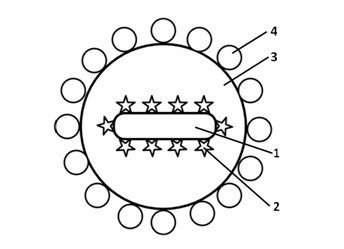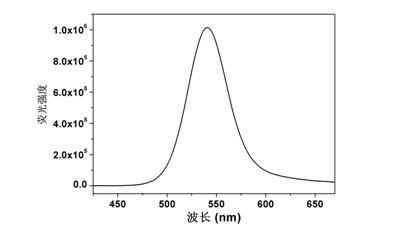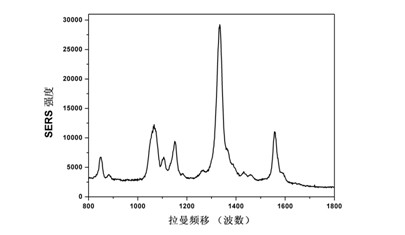Dual-mode optical coding probe and preparation method thereof
An optical encoding, dual-mode technology, applied in the field of nanomaterials, can solve the problems of SERS spectral overlap, the number of spectrally distinguishable codes, and the limited spectral range, etc., to achieve high repeatability, enhanced optical encoding ability, and simple preparation method. Effect
- Summary
- Abstract
- Description
- Claims
- Application Information
AI Technical Summary
Problems solved by technology
Method used
Image
Examples
preparation example Construction
[0029] The preparation method of the above-mentioned dual-mode optically encoded probe comprises the following steps:
[0030] Step 1. Prepare the original gold nanorod solution: firstly mix the hexadecyltrimethylammonium bromide solution and the tetrachloroauric acid solution, then add the sodium borohydride solution and stir evenly to obtain the gold seed solution; Add silver nitrate solution, tetrachloroauric acid solution, deionized water, and ascorbic acid solution to the hexaalkyltrimethylammonium bromide solution in turn until the mixed solution becomes colorless to make a growth solution; finally add gold to the growth solution. Seed solution to obtain the original gold nanorod solution;
[0031] Step 2. Preparation of Raman molecularly labeled gold nanorods: After the original gold nanorod solution prepared in step 1 is centrifuged with a centrifuge, a precipitate is formed in the original gold nanorod solution, and the precipitate is extracted and added to deionized ...
Embodiment 1
[0035] Using gold nanorods as SERS-enhanced substrates, 5,5-dithiobis(2-nitrobenzoic acid) (DTNB) molecules as SERS markers, and cadmium telluride quantum dots as fluorescent materials to prepare dual-mode optical codes Probe particle, preparation method comprises the steps:
[0036] Step 1. Prepare the original gold nanorod solution: first prepare the gold seeds, at room temperature (that is, in the temperature range of 23~30 °C, the room temperature mentioned below is the same as this), 2.5mL 0.2M hexadecyltri Mix methyl ammonium bromide (abbreviated as CTAB) solution with 1.5mL 1.0mM tetrachloroauric acid solution, stir vigorously and add 0.6mL 0.01M ice-cold sodium borohydride solution, stop stirring after 2 minutes to obtain brown-yellow seed solution. Then prepare the growth solution, add the following reagents in sequence to 50mL 0.2M CTAB solution at room temperature: 2~4mL 4mM silver nitrate solution, 5mL 15mM tetrachloroauric acid solution, 45mL deionized water, and ...
Embodiment 2
[0042] Using gold nanorods as SERS enhanced substrates, using 4-mercaptobenzoic acid (4MBA) molecules as SERS markers, and using cadmium telluride quantum dots as fluorescent materials to prepare dual-mode optically encoded probe particles, the method includes the following steps:
[0043] Step 1: Prepare the original gold nanorod solution. The original gold nanorod solution was prepared according to the dosage and steps in Example 1.
[0044] Step 2: Attach 4MBA molecules to the surface of gold nanorods. Take 5 mL of the original gold nanorod solution and centrifuge once at 10,000 rpm for 30 minutes to remove excess reactants. Disperse the centrifugal precipitate into 5mL deionized water, add 10~50 μL 10mM 4MBA ethanol solution, and stir vigorously for more than 3h.
[0045] Step 3: the surface of the gold nanorods connected with 4MBA molecules is coated with silicon dioxide, and a solution of metal-mediated composite nanospheres is prepared. Centrifuge the solution prepar...
PUM
 Login to View More
Login to View More Abstract
Description
Claims
Application Information
 Login to View More
Login to View More - R&D
- Intellectual Property
- Life Sciences
- Materials
- Tech Scout
- Unparalleled Data Quality
- Higher Quality Content
- 60% Fewer Hallucinations
Browse by: Latest US Patents, China's latest patents, Technical Efficacy Thesaurus, Application Domain, Technology Topic, Popular Technical Reports.
© 2025 PatSnap. All rights reserved.Legal|Privacy policy|Modern Slavery Act Transparency Statement|Sitemap|About US| Contact US: help@patsnap.com



